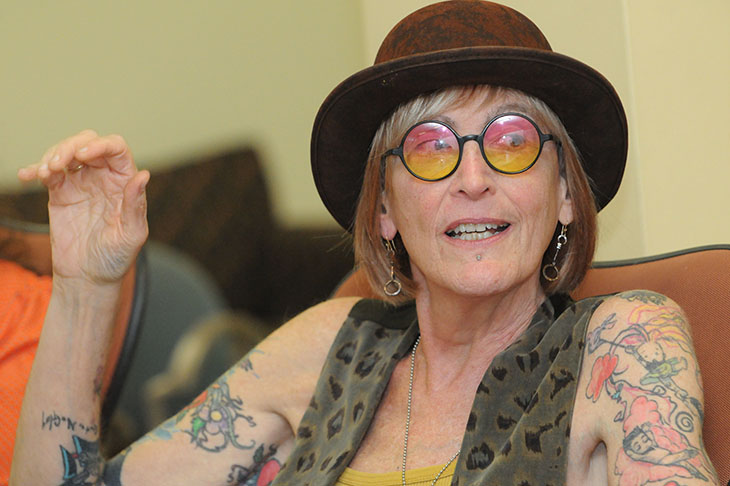"Are you a man or a woman?"

A self-described “tranny,” author Kate Bornstein says, “It breaks my heart that people are hurt at all, and, since I live by my words, it hurts me that people are ever hurt by words ⦠To the degree that we own, celebrate and revel in words that are used to shame us, those words have no power to shame us in our lives.” (Photo by Cheryl Gerber)
Kate Bornstein describes herself as a “tranny.” Among other things.
The transgender person, gender theorist and writer packed the house at Tulane University for a frank talk about sex, gender and identity. And to listen.
“In the end, 'Are you a man or a woman?' becomes a really stupid question.”—Kate Bornstein
She wanted to “hear from the students what"s needed now.”
Bornstein was on campus Monday (Oct. 20) to meet with students, including members of the Gender Exploration Society, and present the Custard Lecture she titled “World Peace through Gender Anarchy and Sex Positivity.”
The lecture, hosted by the Newcomb College Institute, the Stone Auditorium in Woldenberg Art Center was overflowing, with students carpeting the floor.
The author of A Queer and Pleasant Danger: The true story of a nice Jewish boy who joins the Church of Scientology and leaves twelve years later to become the lovely lady she is today, punctuated her talk with F-bombs and illustrated it with animated graphics.
Gender and sexuality are not binary, Bornstein said, encouraging students to find out their “real” gender and sexuality.
“You can"t look at gender well without looking at it in context of all these other factors,” Bornstein said, showing a list of 15 factors, including race, class, age and religion. “"Are you a man or a woman?" becomes a really stupid question. Either/or is the language of bullies ⦠To the degree we answer "yes" or "no," I"m one or the other, we are giving up our imagination, and we are allowing someone else to tell us all the possibilities of us.”
Bornstein said she has discovered over 700 sexuality identities “by Googling,” beyond LGBTQA (lesbian, gay, bisexual, transgender, queer/questioning and allies), and she believes the current alphabet-soup nomenclature will be abandoned.
“Binaries rob us of our imagination, our compassion, our ability to see deeper into the person we"re with.”
